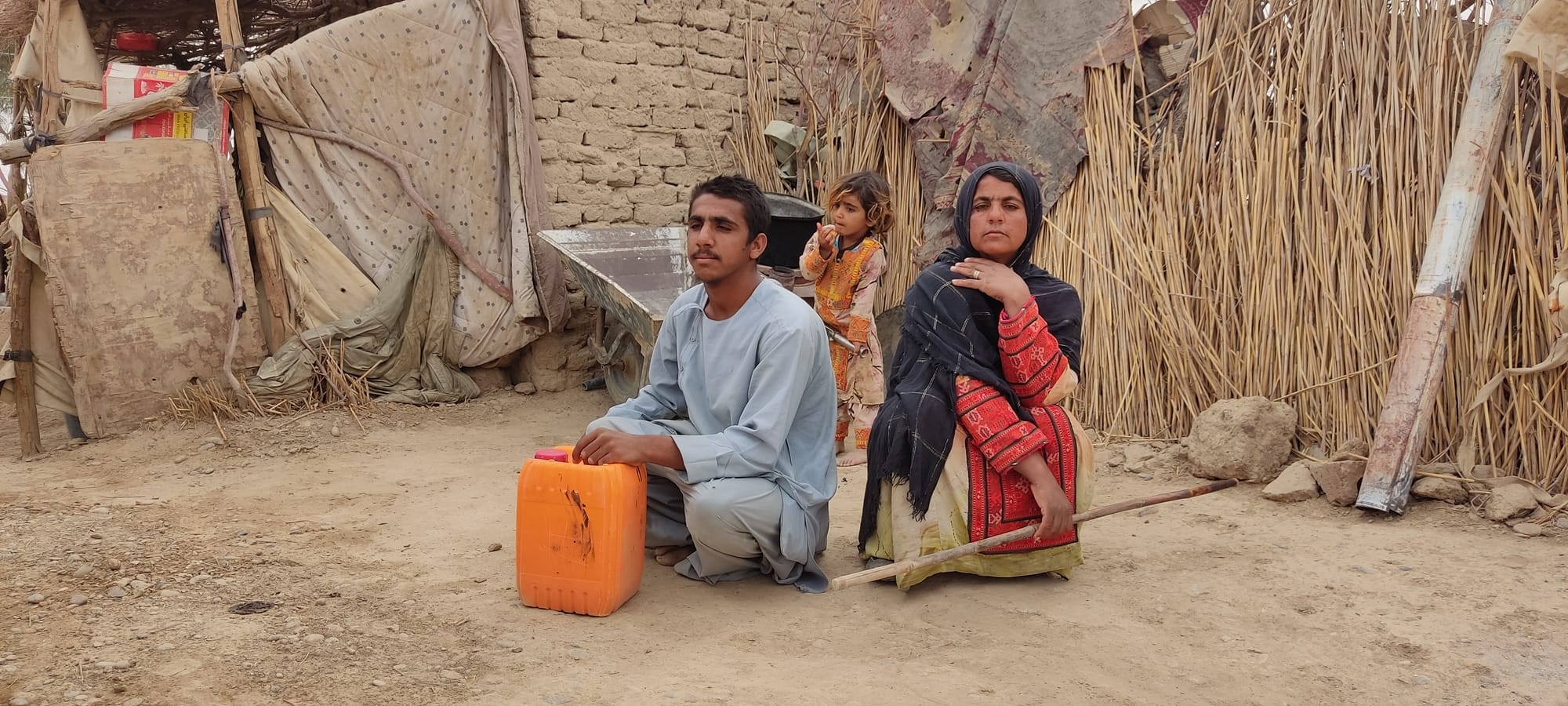Education Leaves Disabled Behind
Afghans face many barriers to accessing education, from lack of schools to poverty or family and social biases. However, disability is one of the worst as it can prevent Afghan youth from overcoming even the most simple barriers.
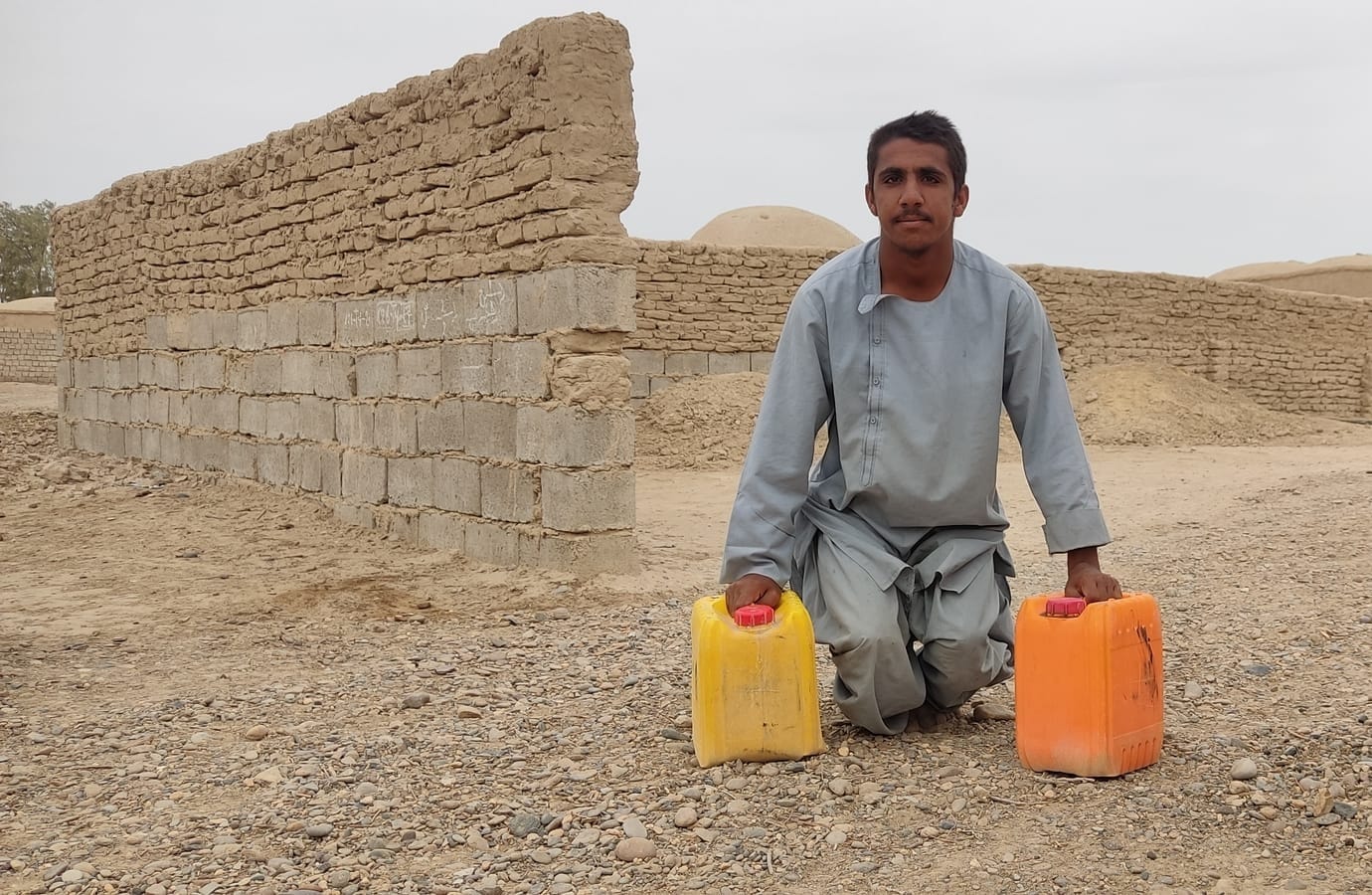
This article is part of a broader series exploring changes regarding access to education in Afghanistan, created with support from Afghan Witness (a project of the Centre for Information Resilience), which uses open-source investigating to expose human rights violations and counter mis- and disinformation. This series will incorporate open-source techniques to further corroborate the investigative reporting. Please click here to read previous publications in the series by Alive in Afghanistan.
AFGHANISTAN, NIMROZ — A strong wind rips around me as Sadis makes his way across the gravel-strewn yard to meet me in front of his family’s home in Baynazar, thirty kilometers outside Zaranj, Nimroz’s provincial capital. Sadis cannot walk, but makes his way toward me by using two cube-shaped plastic jugs. The jugs make a crunching sound on the gravel as Sadis approaches, followed by his sister who is also disabled, but able to walk with a cane.
Sadis tells me he feels the difficulty of being paralyzed more each day because his legs get pressed against thorns and pebbles on the ground, causing pain at night.
"I was six years old when I became paralyzed. Due to not having healthy legs, I couldn't go to school, even though there was a school in our area. But the route to school was a bit far for us. Other children went to school, but I remained illiterate, unfortunate, and hopeless."
According to Kate Pond of UNICEF, Polio is still endemic in Afghanistan – one of the last two countries in the world. Despite the collapse of the previous government, the Global Polio Eradication Initiative continues to operate in Afghanistan which, along with Pakistan, are the only two countries where polio has not yet been eradicated.
"No one knows better than me how valuable health is. God took away my legs, which prevented me from reaching anywhere. I couldn't even learn about God and His creations more. I stayed behind in this village, distant and alienated from people. Nobody asks about our condition year after year."
Sadis, while speaking, chokes up and smiles. He feels the pressure of the camera but is very despondent and disheartened by his current situation and wants to express his heart's desires or the things left unsaid.
When Sadis wants to go somewhere, he takes two empty barrels and uses them as a cane to walk. However, while his feet become sore and wounded, there are also traces of wounds on his fingers because he puts all his weight on the barrels with full force.
Sadis had a great desire to learn, but his disability has deprived him of all the desires in his heart.
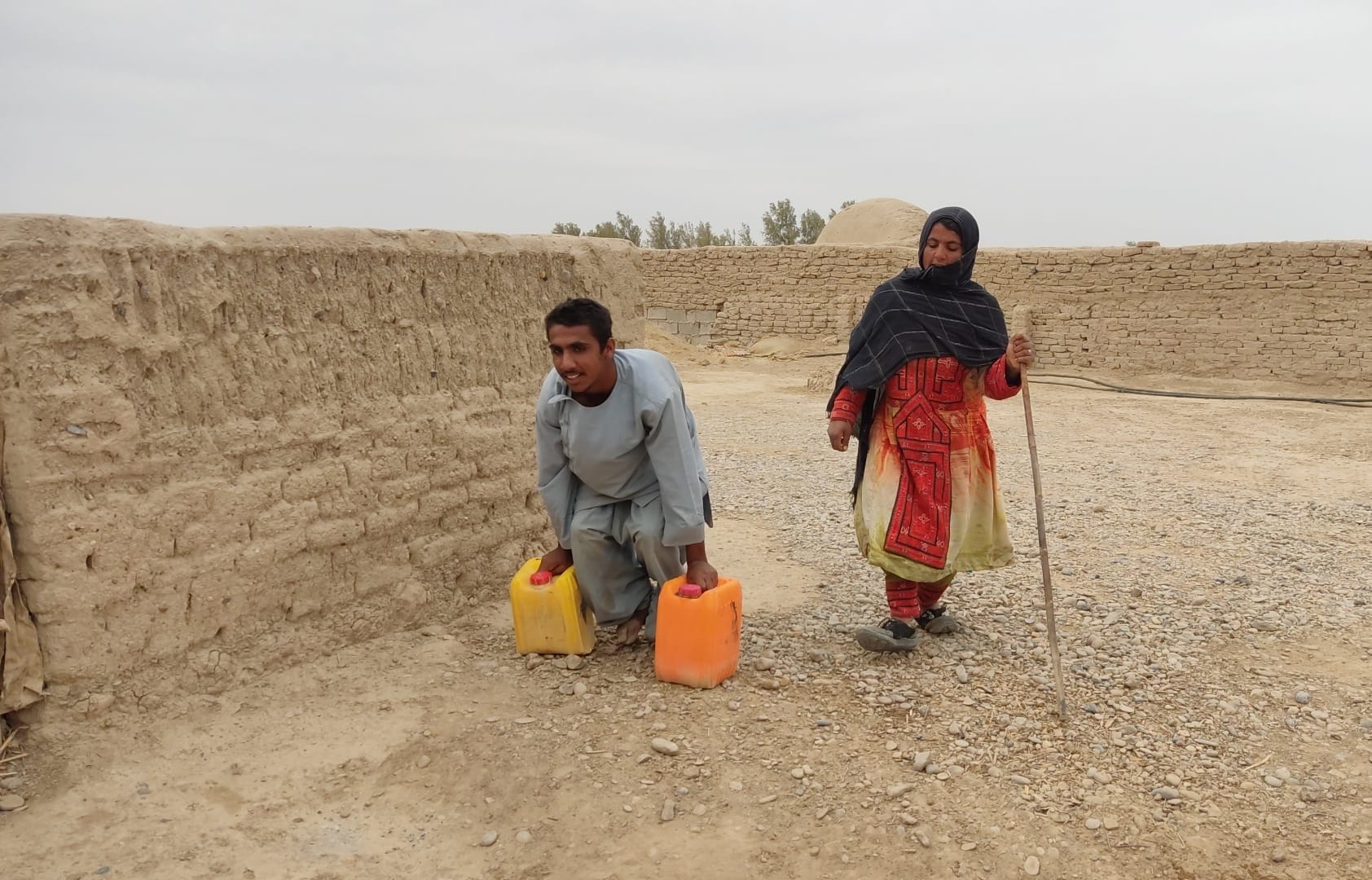
Eighty Percent of Afghan Adults Live With Disability
According to a report from Human Rights Watch produced between April 2018 and January 2020, Afghanistan has one of the largest populations per capita of persons with disabilities in the world. At least one in five Afghan households includes an adult or child with a serious physical, sensory, intellectual, or psychosocial disability.
One student who uses a wheelchair described the problem she faced trying to attend school: “Unfortunately, I cannot go to school by myself—I need someone to take me to school and pick me up. The school has no ramp, so it’s hard for me to get in and out of the classroom, and sometimes even that’s impossible.”
These challenges persist, even though Afghanistan joined the Convention on the Rights of Persons with Disabilities in 2012, a UN protocol that reaffirms that all persons with all types of disabilities must enjoy all human rights and fundamental freedoms.
A plurality of Afghans suffer from some form of disability, according to a national survey by the Asia Foundation in 2019, which found that eighty percent of Afghan adults live with a disability, including 13.9% who are severely disabled.
22-year-old Humayoun, born paralyzed from the waist down, said, “We lived in Ziaratja, a village in Herat’s Guzara district. The distance from our house to school was 12 kilometers. I was disabled and didn’t have any transportation, so I couldn’t study.”
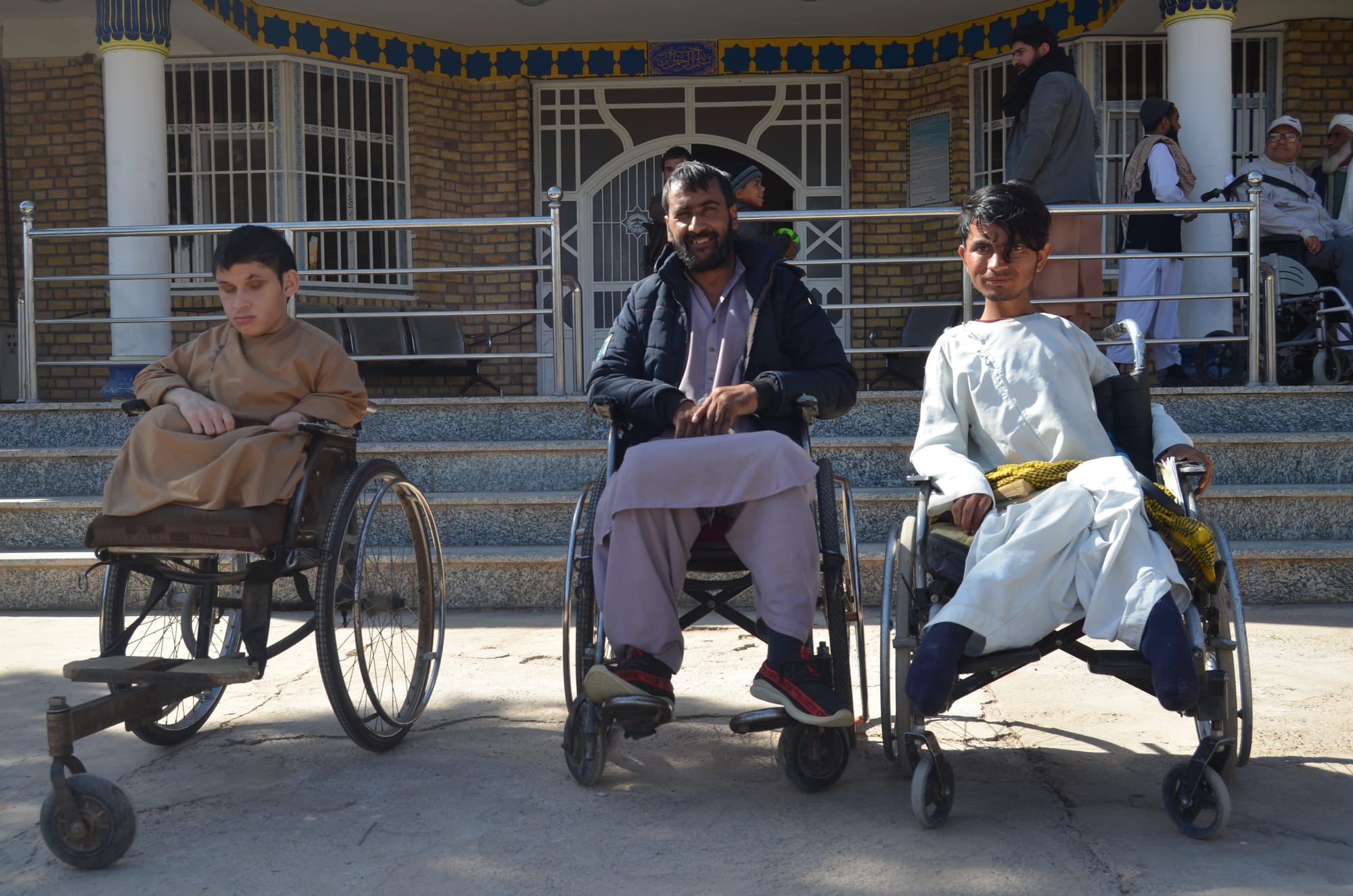
Humayoun gets upset recalling his childhood, “Suffering from disability made me sad and made my psychological and mental situation worse every day. My family saw me differently; my able-bodied brothers wouldn’t take me to school, would call me names, and said, ‘You are a cripple, stay home!’”
“I would be humiliated by my own family members; my brothers wouldn’t take me anywhere. They would say, ‘We would look bad if you go with us.’ They were ashamed of taking me with them,” Humayoun recalls these memories sadly.
One of the local villagers gave Humayoun the phone number of a disability home in Herat City, the capital of Herat province. He managed to get himself to the home on his own, applied, and was accepted. He is currently an 8th-grade student being supported through the disability home in Herat.
“I want to become a good therapist so I can help people with psychological and mental issues,” Humayoun told Alive in Afghanistan.
22 year-old Naqibullah Tanha, an Afghan suffering from disability living in the home with Humayoun was paralyzed following a car crash when he was 9.
Naqibullah who is a 6th grade student currently, couldn’t go to school during his childhood due to lack of school in his home village, and the distance of school from his home.
“The nearest school was 10 kilometers away, I couldn’t make that with a wheelchair!” Naqib said.
The Convention on the Rights of Persons with Disabilities instructs signatory countries to foster an attitude of respect for the rights of persons with disabilities; and recognize the importance of accessible education for all. However many Afghan schools are still not meeting the most basic expectations of accessibility for Afghan children with disabilities.
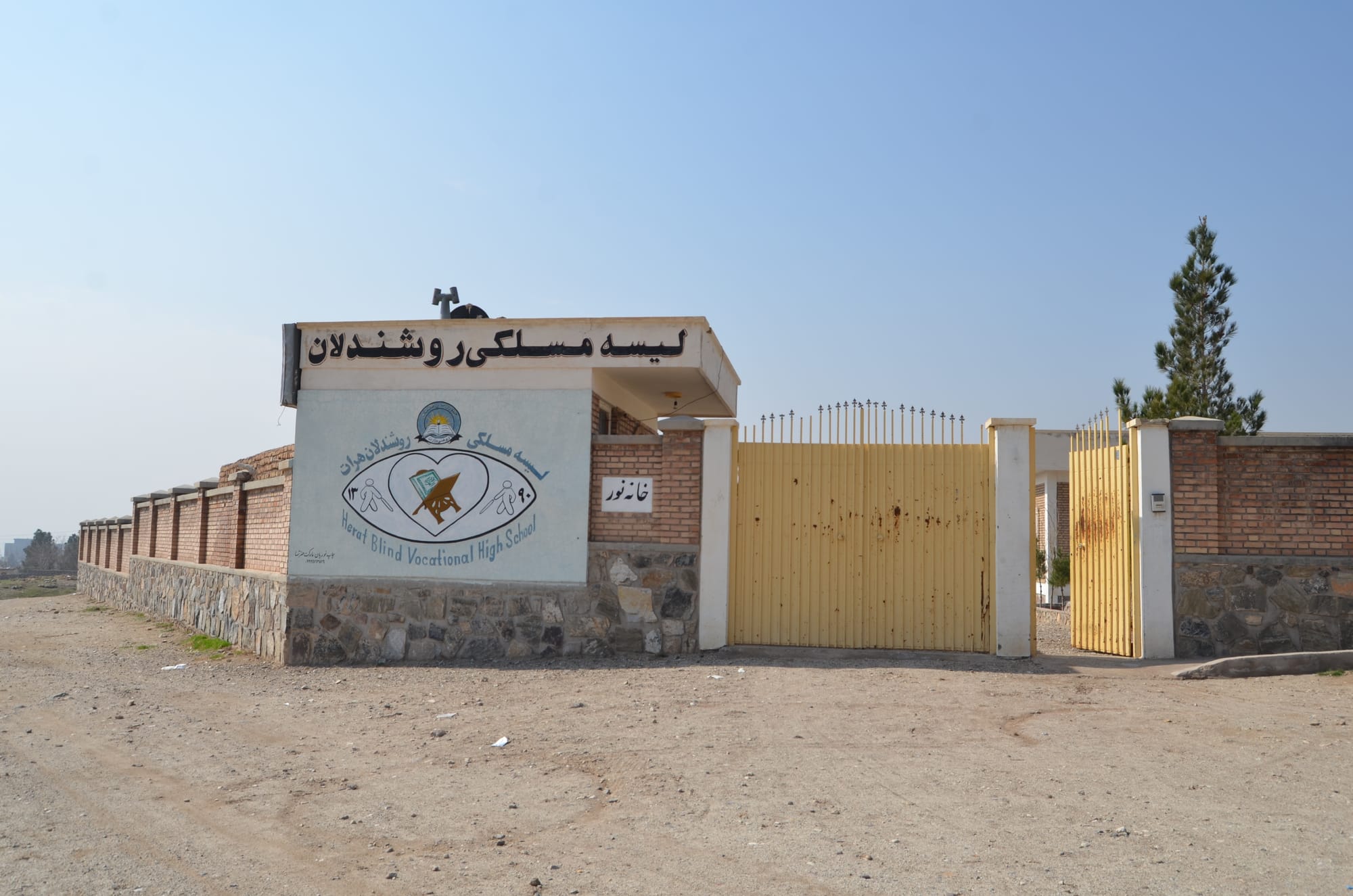
Schools for the Disabled
In some areas of Afghanistan there have been successful efforts to provide access to education for the disabled. At Roshan Delan (Bright Hearted), a vocational high school for the blind in Herat City, the capital of the province of Herat, visually impaired students learn to read and write in Braille, along with studying other subjects.
Nazar Mohammad Helal, a teacher at Roshan Delan who is also blind, told Alive in Afghanistan, “I teach students at this school due to my own interest in teaching and as a result of encouragement from my family. I teach Braille, tracking, teaching, and more.”
Under Mr. Helal’s guidance, the Roshan Delan High School has graduated 350 students. Mr. Helal urges the public not to discriminate against blind people.
There are 197 blind students registered at the Roshan Delan High School, with over 130 of them, 44 women and 88 men, attending in person. Five classes have graduated from the high school since 2011.
Roshan Delan was established in 2003, upgrading to a vocational school in 2010. However, according to Nematullah Rasooli, the facility’s headmaster, the school lacks repairs and suffers from a shortage of books.
AFGHANISTAN — People from across Afghanistan speak about their lives and how disability affected their access to education. According to Human Rights Watch, Afghanistan has one of the largest disabled populations in the world.
In Zaranj, the capital of the province of Nimroz, the Imam Bukhari School provides support for children with disabilities. However the Imam Bukhari School is a private institution, and therefore not all Afghans who need its support can afford to send their children.
Atifa Karimi, the headmaster of Imam Bukhari, gathers the students every morning at 7 am. However, 11-year-old Niyayesh, due to her physical disability, joins the lineup a little late. Her father transports her to school each day. When they arrive he takes the stroller Niyayesh uses as a wheelchair from the back of his car, and assists her in entering the classroom.
Niyayesh is not the only child at Imam Bukhari struggling with a disability. Hania Baloch, a 10-year-old girl placed in a class with 5 to 6-year-old children, sits in the middle of the classroom and engages in self-talk. Hania has a mental disability and requires assistance from others to wipe the saliva running out of the corners of her mouth. Only the headmaster can comprehend her speech and understand her needs.
Mrs. Karimi adds that Hania used to bite other students and teachers after she was enrolled but is, “Currently the calmest student among her classmates.”
In addition to her mental disability, Hania struggles with a speech impediment. When the teacher asks her questions, she responds with only smiles and unintelligible mumbling. She primarily desires to play and has retained very little of the education she has received thus far, and is developmentally delayed by six years. Hania's bathing, hygiene, and other personal needs are attended to by her sister and mother.
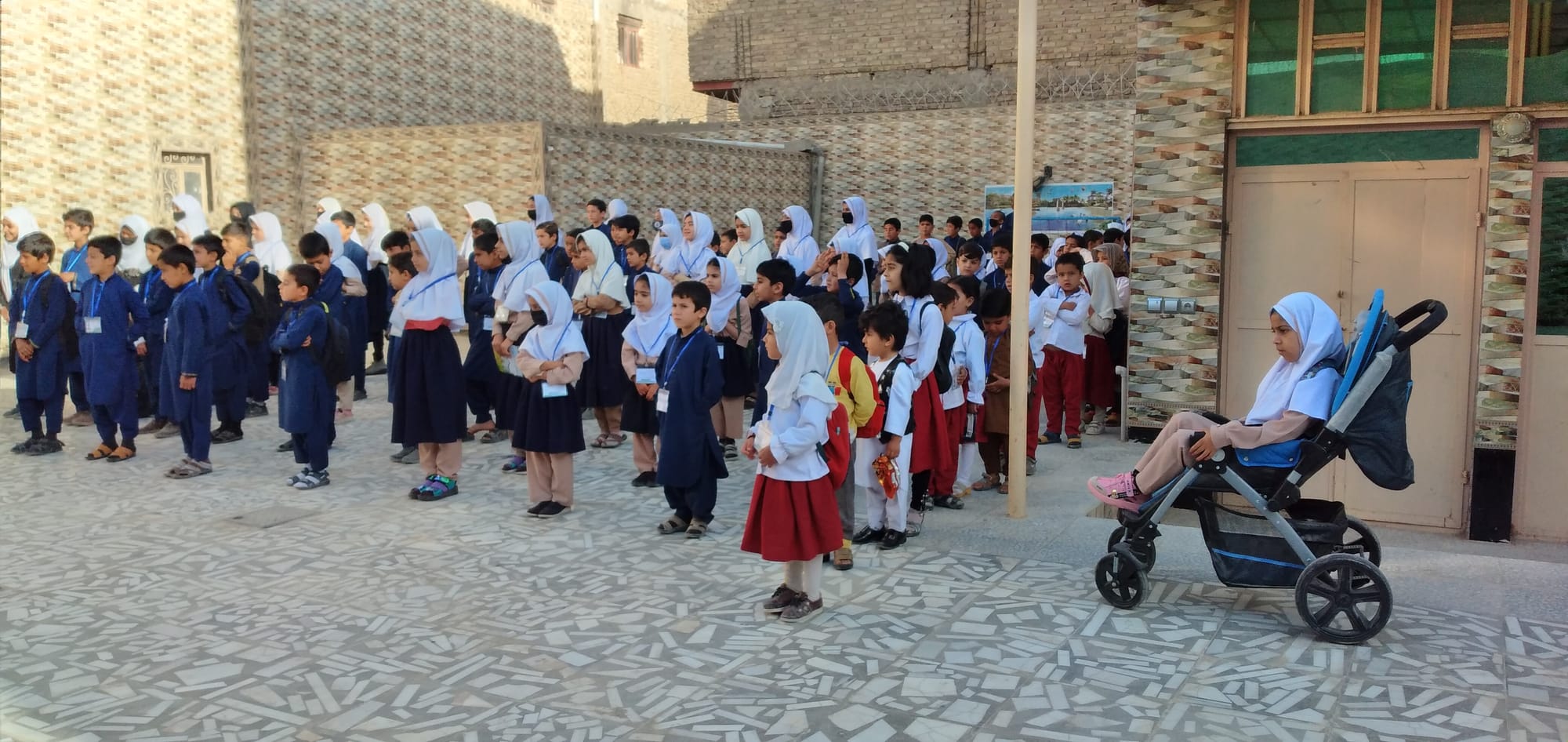
“Families have a 50 percent role in educating their children, but Hania’s family never asks her about her studies. Sometimes her father calls and asks if she needs anything, but her mother never called to ask why Hania didn’t write, or why isn’t she saying anything. Hania would have had more progress if her parents took a more active role,” Mrs. Karimi says.
“These children have a right to study. Hania’s parents tried to register her at a government school two years ago, but despite education being free for Afghan children, the school and teachers did not accept her, leaving her to lag behind other children [of her age group],” Mrs. Karimi tells Alive in Afghanistan.
Long Distances Isolate the Disabled
Disability limits access to education all across Afghanistan, for many reasons, however the most common is likely the sheer difficulty the disabled face when trying to get to school. As Alive in Afghanistan reported previously, Afghanistan is a large, mostly rural country and children must often travel long distances to reach school.
Children like Sadis and his sister Fayza have difficulty walking as a result of contracting polio. Fayza is 25 years old and became disabled at the age of 12 due to lack of access to polio vaccine, but her disability is less severe compared to her brother Sadis.
Fayza can walk with a limp using a cane, but occasionally she feels weakness in her legs and sits down on the ground.
Both sisters and brother feel suffocation and shortness of breath after walking for three minutes and cannot continue their journey.
Fayza says she is very troubled by being afflicted with this disease, as people see her as incomplete. She sees all the factors of her backwardness in her disability.
"I am now a patient; I couldn't get married, start a family, progress. My brother and I haven't left the house for years. We don't see the world or the city. We don't participate in people's joys and sorrows. We haven't studied; we haven't progressed; we grew up illiterate."
She says she had a great interest in studying until she reached the second grade of school. But when she became paralyzed, she couldn't continue because the school was 500 meters away from home, and these two siblings couldn't walk that distance.
According to Fayza, the government has not provided any support to them so far, and no institution has come to their village to provide them with tools such as a cane, wheelchair, or crutches. So they are forced to use wood and plastic barrels as a cane.
Fayza believes if she hadn't become paralyzed and continued her education, she would have become a worthy teacher and could have taken care of her living expenses.
On the other side of Afghanistan, in the province of Baghlan, a 26 year-old woman named Anisa never had the opportunity to go to school. Like Sadis and Fayza, she was not vaccinated as a child and contracted polio, which lead to her becoming deformed and partially paralyzed.
There are many reasons the people in Afghanistan continue to contract polio. A lack of awareness and disbelief in families about the polio disease is one reason for low vaccination. Additionally Afghanistan’s many wars prevented vaccines and vaccinators from reaching remote areas. Furthermore Afghanistan’s impassable roads, and the overall poverty have made it challenging for Afghans to reach hospitals in often distant provincial capitals and urban centers, leading to the paralysis of a number of children due to polio in recent years.
If I Were Not Paralyzed, I Would Like to Marry
In the middle of the village, children of various heights are running toward a flowing water channel, laughing as they escape the heat and cool off. The scene reminds me of my own childhood, when I used to play with healthy girls of the same age. I'm still lost in my childhood memories when the driver says, "Get out, we've reached our destination."
I knock on Anisa's large wooden gate, and a faint voice from a girl says, "Come inside!" As the gate opens, my eyes fall on a girl in red attire standing next to the wall, bent at the waist. She has khaki shoes on both hands to protect them from harm when she crawls.
As she moves, she places her hands on the ground and, with legs that have been immobile for many years, she makes a difficult journey from one place to another. With hazel eyes and a smile sealed on her lips, she gazes deeply at me, conveying an emotion as if a cure for her condition has arrived.
I enter her small room to delve deeper into the story of her paralysis and adventurous life. Anisa is paralyzed from the waist down and struggles to perform household chores. She says that when she needs to use the bathroom, she cannot easily carry the water bucket to the bathroom due to her inability to walk.
"Every morning, I sweep the house, and if I have the patience, I sweep the courtyard. If not, I leave it as it is. In the bathroom area, if there's water, I take a bath; if not, I sit on the floor with one hand holding a water bucket handle, and I move the bucket forward while moving myself behind it to reach the bathroom."
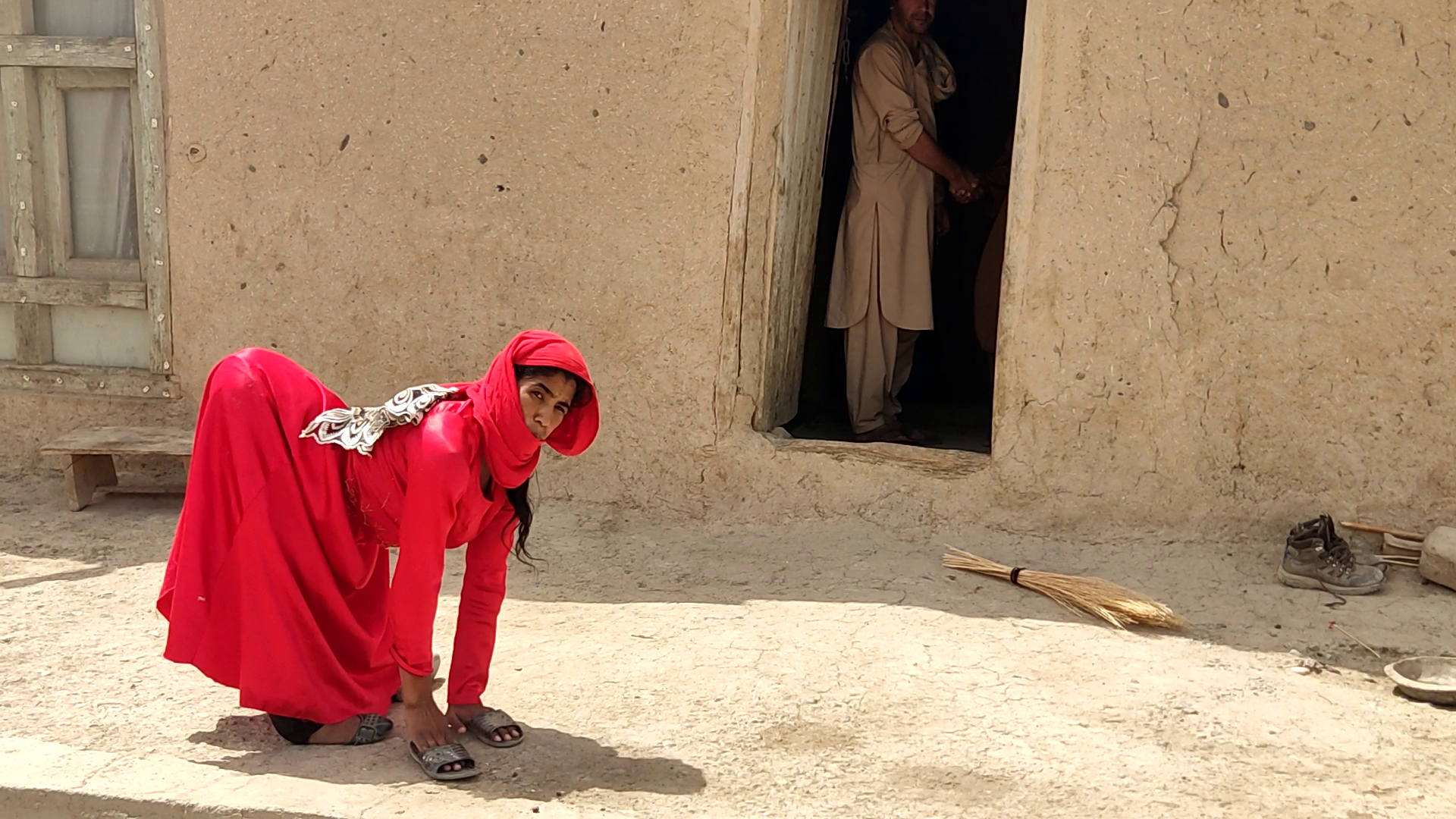
Anisa, a girl whose life has taken an unexpected turn from her childhood dreams, says, "A person's wishes never end until they die. If I weren't paralyzed, I would have liked to get married and have a family."
Anisa attributes the reason for her paralysis to her family's disbelief in polio vaccination, economic difficulties, and lack of proper protection during her childhood.
No efforts have been made to treat her, and she says that due to her economic difficulties, she has not been taken to more experienced doctors outside of Baghlan such as those in Kabul. "At that time, doctors in Baghlan said it was polio and needed to be taken to Kabul for treatment. They never took me to Kabul. They only took me to a religious scholar in Andarab District once for treatment, but it was in vain."
Anisa expresses her struggles with the immobility of her legs, economic difficulties, and the hurtful behavior of others, which brings tears to anyone's eyes: "Neighbors used to say it would be better if I died rather than live this way. What's the point? I heard their words and was deeply affected. Instead of uplifting a patient's spirit, their poisonous words break it."
Her biggest regret in life is the inability to move her legs. She says that if her legs could move, she would study and attend school like other girls.
No One Left to Teach
Fatima, a 60-year-old mother of these two disabled children, says that living in the village of Baynazar, they have no access to any kind of health or educational services, which is why her two children became paralyzed and disabled.
According to her, when her son Sadis was six years old, he had a fever for three nights, but because they were poor and couldn't afford it, she couldn't take him to the health center in Zaranj. Gradually, the child began to feel weakness and incapacity and couldn't walk properly until his leg veins dried up and he became immobile.
Fatima says that being distant from the city, poverty, and deprivation are all factors contributing to their misfortune.
"For years, no one has visited us in our village. Both of my children are disabled, but no one helps. I went to the district administration and disabled office a couple of times, but no one cooperated. They haven't provided any facilities for them [Sadis and Fayza]."
She says Fayza was in the second grade of school. At that time, a school had just been established in their village, and she was very eager to study. She had a fever one night, and from the next day, she felt weak and started walking abnormally. But after a week, she couldn't walk properly anymore.
According to Fatima, both of her children became victims of polio due to lack of access to health services, and then they suffered the greatest loss, which was being deprived of education.
"My daughter was very deserving; she was eager to study. In our village, there was only one teacher who taught students. After Fayza became paralyzed, that teacher passed away, and people no longer saw any good in education in this village."
